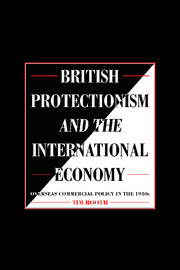Book contents
- Frontmatter
- Contents
- Preface
- List of Tables
- Introduction
- 1 Britain's international economic position in the 1920s
- 2 The political economy of protectionism
- 3 Imperial preference and the Ottawa Conference
- 4 The Scandinavian negotiations: formulation of policy
- 5 Completion of the first phase of negotiations: Scandinavia, Germany and Argentina
- 6 The world economic conference, Finland and Japanese competition
- 7 The Baltic states and Poland
- 8 British agricultural policy and imports during the 1930s
- 9 British exports to the trade agreement countries
- 10 Appeasing Germany and the United States
- 11 Some general conclusions
- Appendix A United Kingdom: payments, clearing etc., Agreements in force 1931–1938
- Appendix B Miscellaneous trade and payments agreements
- Appendix C Imports into Britain from foreign agreement countries
- Appendix D Total exports from Britain to foreign agreement countries and four dominions
- Appendix E Imports of selected commodities into UK, 1931, 1937, showing percentage from Empire sources
- Bibliography
- Index
2 - The political economy of protectionism
Published online by Cambridge University Press: 06 July 2010
- Frontmatter
- Contents
- Preface
- List of Tables
- Introduction
- 1 Britain's international economic position in the 1920s
- 2 The political economy of protectionism
- 3 Imperial preference and the Ottawa Conference
- 4 The Scandinavian negotiations: formulation of policy
- 5 Completion of the first phase of negotiations: Scandinavia, Germany and Argentina
- 6 The world economic conference, Finland and Japanese competition
- 7 The Baltic states and Poland
- 8 British agricultural policy and imports during the 1930s
- 9 British exports to the trade agreement countries
- 10 Appeasing Germany and the United States
- 11 Some general conclusions
- Appendix A United Kingdom: payments, clearing etc., Agreements in force 1931–1938
- Appendix B Miscellaneous trade and payments agreements
- Appendix C Imports into Britain from foreign agreement countries
- Appendix D Total exports from Britain to foreign agreement countries and four dominions
- Appendix E Imports of selected commodities into UK, 1931, 1937, showing percentage from Empire sources
- Bibliography
- Index
Summary
After nearly eighty years of free trade, the return to protectionism by Great Britain in 1931–2 was a dramatic event in its economic history. Interpretations of this policy reversal vary widely. For some authors it was an inevitable if perhaps belated consequence of relative economic decline. As mentioned earlier, Stephen Krasner argues that since free trade suits the strong, Britain's loss of international economic hegemony in the late nineteenth or early twentieth century demanded a change in the commercial policy regime. This does not mean the depression was insignificant in the decision. Quite the reverse, for ‘systems are initiated and ended, not as state-power theory would predict, by close assessments of the interests of the state at every given moment, but by external events – usually cataclysmic ones’, and Krasner argues that the slump provided the spur necessary to bring about a return to protection that objective assessment would long have seen as the appropriate policy regime for a second-class economic power. This longer-term perspective is consistent with the views of Forrest Capie, who has emphasised the build-up of protectionist pressures in Britain before the slump, particularly from the steel industry.
A radically different perspective is provided by Barry Eichengreen in his study Sterling and the Tariff, 1929–32. Relying heavily on the records of the Treasury and the Economic Advisory Council, Eichengreen produces a lucid study of economic thought and policy advice in the early stages of the slump.
- Type
- Chapter
- Information
- British Protectionism and the International EconomyOverseas Commercial Policy in the 1930s, pp. 35 - 70Publisher: Cambridge University PressPrint publication year: 1993



